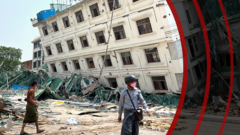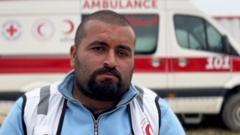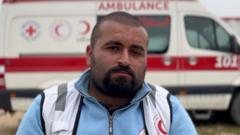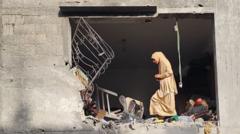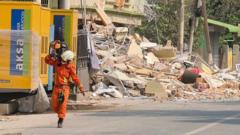The prolonged Israeli blockade on Gaza has led to the closure of UN-supported bakeries, extreme food shortages, and the rationing of essential medical supplies amid a devastating humanitarian crisis. With the humanitarian situation deteriorating, international calls for aid access intensify.
Gaza Faces Worsening Humanitarian Crisis as Bakeries Close Amid Ongoing Israeli Blockade
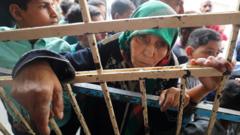
Gaza Faces Worsening Humanitarian Crisis as Bakeries Close Amid Ongoing Israeli Blockade
After a month of an intensified blockade, Gaza grapples with severe food shortages, closed bakeries, and rationed medical supplies, raising global concerns for humanitarian intervention.
The humanitarian crisis in Gaza has deepened significantly following a month-long Israeli blockade that has seen all UN-supported bakeries shutter, markets stripped of fresh produce, and hospitals forced to ration painkillers and antibiotics. This blockade marks the most extended period without supplies amid the ongoing conflict, which has persisted for nearly 18 months. Many residents, including Um Ali Hamad from Beit Lahia, report suffering from severe food deprivation during the Muslim holiday of Eid al-Fitr, noting that it was their "worst ever Eid."
The Israeli government imposed the blockade on March 2, justified by Hamas's refusal to advance a ceasefire agreement in exchange for hostages. While the recent two-month ceasefire allowed for some humanitarian aid flow—returning 33 Israeli hostages in exchange for numerous Palestinian prisoners—Israel has now reverted to restricting goods, claiming it benefits Hamas more than civilians.
Aid organizations raise alarms about critical shortages of food, medicines, and hygiene products, urging global powers to push Israel to comply with international humanitarian obligations. The UN has reported running low on supplies, with spokesperson Stephane Dujarric describing current stock levels as the "tail end." The situation is exacerbated by the closure of bakeries, deemed essential, leading residents like Abu Alaa Jaffar to express despair over food shortages, with flour prices skyrocketing.
Despite claims from Cogat, Israel's military body, asserting there is adequate food for the population, the UN counters with reports of dire rationing in health services. Aid organizations like ActionAid condemn the blockade as appalling, predicting dire consequences like starvation.
This blockade, and the renewed military operations that resumed on March 18, have hampered vital deliveries of humanitarian aid, overwhelming local hospitals that lack basic supplies. The World Health Organization has signaled a healthcare crisis, with hospitals overwhelmed and basic medical supplies running low. Reports indicate the death of over 1,066 Palestinians, a significant number being children, since the commencement of the renewed military offensive.
The ongoing situation further complicates regional dynamics, with international calls mounting for a halt to what many agencies term "collective punishment" of the Palestinian people. As mediators attempt to negotiate a ceasefire, the blockade remains firmly in place, highlighting the urgent need for humanitarian access and intervention to alleviate this burgeoning crisis.

